My take on “true love” is this: You can’t be sure it’s true until you’ve traveled together.
When Jason and I were planning our honeymoon, months before we even got on the plane, I knew the two of us made a great match.
For instance, there was no argument about what should be our top priority in deciding which country to go to. Of course it would be cuisine.
After running a variety of potential honeymoon locations through the cuisine filter, we began discussing what we might want to do with our time besides cook and eat (and, um, sleep). Our second priority, we agreed, was being in a place where we could simultaneously relax and absorb culture. We wouldn’t have to leave a resort or cruise ship to go off in search of whatever it was that might make the place “ethnic” and unique. There wouldn’t be a checklist of “must-sees” to work through—no posing for pictures by each iconic sight to prove we had indeed been there. We wanted to simply be—to do everyday things we love to do at home, like read, sit outside at cafes and talk, cook together, take walks at sunset—but in a completely different place.
With healthy doses of self-control, that type of travel experience can be had just about anywhere, but we wanted to go someplace where we wouldn’t even feel lured into a trap of tourist rushing and doing, checking train schedules, packing our bags and moving from one hotel to another in an attempt to “see it all.” Our choice would completely eliminate the possibility of people later saying, “You went to [fill in the country] and you didn’t go see [fill in the artwork, cathedral, city, castle, etc.]???”
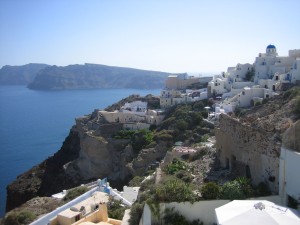 Clearly, that narrowed our list down to a very easy choice: to honeymoon on a small Greek island.
Clearly, that narrowed our list down to a very easy choice: to honeymoon on a small Greek island.
And on that small island, we chose a town high up on the cliffs—one without a port large enough to handle passing cruise ships, or roads wide enough for tourist buses.
And in that small town, we chose to stay in a small, kitchen-equipped apartment carved right into those cliffs (locally known as “cave houses”).
And there, in and around our small cave, overlooking the Caldera and the sea, we went about our everyday lives in a completely new way.
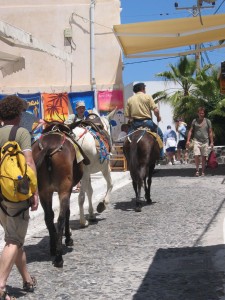 Oia (pronounced ee-ah) on the island Santorini has the perfect mix of everything and nothing: winding, narrow lanes and walks with room only for pedestrians and the donkeys that transport loads too heavy for people; local craftspeople and shops, complete with the town’s collection of sweet stray dogs napping in the sun; markets selling local yogurt, figs, wine, honey, eggs, cheese, and olives; and views of the sea and sunsets that take your breath away.
Oia (pronounced ee-ah) on the island Santorini has the perfect mix of everything and nothing: winding, narrow lanes and walks with room only for pedestrians and the donkeys that transport loads too heavy for people; local craftspeople and shops, complete with the town’s collection of sweet stray dogs napping in the sun; markets selling local yogurt, figs, wine, honey, eggs, cheese, and olives; and views of the sea and sunsets that take your breath away.
What Oia doesn’t have was just as important to our experience there. It doesn’t have room for motor vehicles of any kind beyond the town perimeter—certainly not for any loud construction vehicles (which means there are no large hotels or multi-storied buildings). It didn’t (in 2007, at least) have wireless Internet (and the cell phones we had at the time were useless there). And it doesn’t have a list of must-see sights (unless you count the sun setting over the Caldera).
It was quiet. It was gorgeous. We could be at home there, yet it was very different from home.
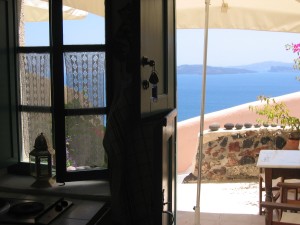 In the mornings we drank coffee and ate farm eggs, or yogurt and figs on our porch, still in our pajamas, idly talking about what we might want to do that day, if anything.
In the mornings we drank coffee and ate farm eggs, or yogurt and figs on our porch, still in our pajamas, idly talking about what we might want to do that day, if anything.
Later, we strolled through town, trying a local restaurant for lunch when our stomachs began to grumble, followed by, perhaps, a longer walk into the countryside, or time with books, coffee and sweets on the terrace. Often we napped in the cool, dimness of our honeymoon cave.
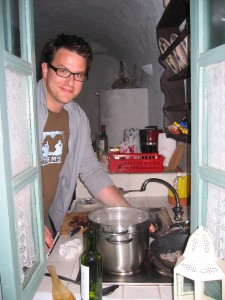 The only rule that seemed to guide us was more like an anti-rule: an unspoken agreement that we would make things up as we went along. Sometimes a trip to the market would inspire a dinner made in our kitchenette. Other times a restaurant we had discovered on a walk earlier that day would be tempting us by evening. Dinners were long and leisurely, and each day ended the same way: with the setting of the sun and the rising of the moon.
The only rule that seemed to guide us was more like an anti-rule: an unspoken agreement that we would make things up as we went along. Sometimes a trip to the market would inspire a dinner made in our kitchenette. Other times a restaurant we had discovered on a walk earlier that day would be tempting us by evening. Dinners were long and leisurely, and each day ended the same way: with the setting of the sun and the rising of the moon.
We have since taken other trips together—including some less leisurely and more scripted than our trip to Santorini. But the ease by which we plan and embark on travels together has continued to be a hallmark of the compatibility in our marriage—one that not only allows us to bond and feel refreshed by our travel experiences, but also spills over into how we travel together through life.
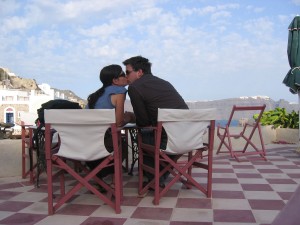
Amazing! Vacations are (usually) intended to be a break from the ordinary yet our lives tend to be over structured and so busy. These trips, focused around ordinary things, are our break with routine. We crave the space to quiet our minds and bodies, and the rare chance to revel (for short times) in blissful boredom.
Oh Kristin, I love this! Your descriptions are artfully crafted. And best of all, your readers know how much you and your husband love one another.